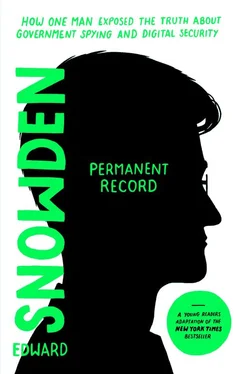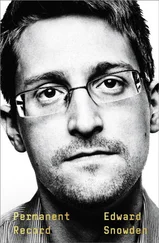After reading this classified report, I spent the next weeks, even months, in a daze. I was sad and low, trying to deny everything I was thinking and feeling—that’s what was going on in my head toward the end of my stint in Japan. I felt like a fool, as someone of supposedly serious technical skills who’d somehow helped to build an essential component of this system without realizing its purpose. I felt used, as an employee of the IC who only now was realizing that all along I’d been protecting not my country but the state. I felt, above all, violated.
I realized that if my generation didn’t intervene, the escalation would only continue. It would be a tragedy if, by the time we’d finally resolved to resist, such resistance were futile. The generations to come would have to get used to a world in which surveillance was a constant and indiscriminate presence: the ear that always hears, the eye that always sees, a memory that is sleepless and permanent.
SIXTEEN
Home on the Cloud
In 2011, I was back in the States, working for Dell, but now attached to my old agency, the CIA. I’d decided it was best to live in denial and just make some money, make life better for the people I loved.
Counting Geneva, and not counting periodic trips home, I’d been away for nearly four years. The America I returned to felt like a changed country. Every other conversation was about some TV show or movie I didn’t know, or a celebrity scandal I didn’t care about, and I couldn’t respond—I had nothing to respond with. A normal life was what Lindsay and I were hoping for. We were ready for the next stage and had decided to settle down. Lindsay was getting certified as a yoga instructor. I, meanwhile, was getting used to my new position—in sales.
My main project was to help the CIA by building it a “private cloud.” It felt as if every major tech company, including Dell, was rolling out new civilian versions of what I was working on. I was amazed at how willingly people were signing up, so excited at the prospect of their photos and videos and music and e-books being universally backed up and available that they never gave much thought as to why such an über-sophisticated and convenient storage solution was being offered to them for “free” or for “cheap” in the first place.
I don’t think I’d ever seen such a concept be so uniformly bought into. I wondered what the point was of my getting so worked up over government surveillance if my friends, neighbors, and fellow citizens were more than happy to invite corporate surveillance into their homes. It would still be another half decade before virtual assistants like Amazon Echo and Google Home were placed proudly on nightstands to record and transmit all activity within range, to log all habits and preferences, which would then be developed into advertising algorithms and converted into cash.
From the standpoint of a regular user, a cloud is just a storage mechanism that ensures that your data is being processed or stored not on your personal device, but on a range of different servers, which can ultimately be owned and operated by different companies. The result is that your data is no longer truly yours. It’s controlled by companies, which can use it for virtually any purpose.
When we choose to store our data online, we’re often ceding our claim to it. Companies can delete any data they object to. Unless we’ve kept a separate copy on our own machines or drives, this data will be lost to us forever. If any of our data is found to be in violation of the terms of service, the companies can delete our accounts, deny us our own data, and yet retain a copy for their own records, which they can turn over to the authorities without our knowledge or consent. Ultimately, the privacy of our data depends on the ownership of our data. There is no property less protected, and yet no property more private.
* * *
The internet I’d grown up with was disappearing. The very act of going online, which had once seemed like a marvelous adventure, now seemed like a fraught ordeal. Every transaction was a potential danger.
The majority of American internet users lived their entire digital lives on email, social media, and e-commerce platforms owned by Google, Facebook, and Amazon. The American IC was seeking to take advantage of that fact by obtaining access to their networks—both through direct orders that were kept secret from the public, and clandestine efforts that were kept secret from the companies themselves. Our user data was turning vast profits for the companies, and the government pilfered it for free. I don’t think I’d ever felt so powerless.
Every morning when I left our town house, I found myself nodding at the security cameras dotted throughout our development. Previously I’d never paid them any attention, but now, when a light turned red on my commute, I couldn’t help but think of its leering sensor, keeping tabs on me. License-plate readers were recording my comings and goings, even if I maintained a speed of thirty-five miles per hour.
In the American system of democracy, law enforcement is expected to protect citizens from one another. In turn, the courts are expected to restrain that power when it’s abused. Law enforcement is prohibited from surveilling private citizens on their property and taking possession of their private recordings without a warrant. There are few laws, however, that restrain the surveillance of public property, which includes the vast majority of America’s streets and sidewalks.
Law enforcement’s use of surveillance cameras on public property was originally conceived of as a crime deterrent and an aid to investigators after a crime had occurred. But as the cost of these devices continued to fall, law enforcement began using them to track people who had not committed, or were not even suspected of, any crime. And the greatest danger still lies ahead, with the refinement of artificial intelligence capabilities such as facial and pattern recognition. An AI-equipped surveillance camera could be made into a sort of automated police officer—a true robocop. Even in 2011, it was clear to me that this was where technology was leading us.
I began to picture a world in which all people were totally surveilled, and all laws were totally enforced, automatically, by computers. Such a world of total automated law enforcement would be intolerable. Most of our lives, even if we don’t realize it, occur not in black and white but in a gray area, where we jaywalk, put trash in the recycling bin and recyclables in the trash, ride our bicycles in the improper lane, or borrow a stranger’s Wi-Fi to download a book that we didn’t pay for. Put simply, a world in which every law is always enforced would be a world in which everyone is a criminal.
I tried to talk to Lindsay about all this. But though she was generally sympathetic, she wasn’t ready to go off the grid, or even off Facebook or Instagram. She thought I was too tense, and under too much stress. I was—not because of my work, but because of my desire to tell her a truth that I wasn’t allowed to. I couldn’t tell her that my former coworkers at the NSA could target her for surveillance or access all the photos she took. I couldn’t tell her that her information was being collected, that everyone’s information was being collected.
I began having strange physical symptoms. I’d become weirdly clumsy, falling off ladders—more than once—or bumping into door frames. Sometimes I’d trip or drop spoons I was holding. I’d spill water over myself or choke on it.
One day when I went to meet Lindsay, I started feeling dizzy. It scared me and scared Lindsay, too. I decided to go to the doctor, but the only appointment wasn’t for weeks.
Читать дальше












